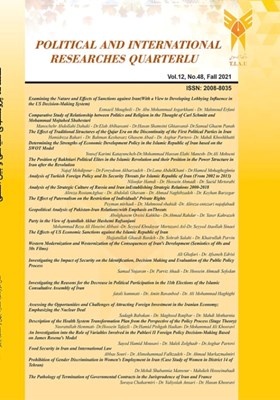The Position of Bakhtiari Political Elites in the Islamic Revolution and their Position in the Power Structure in Iran after the Revolution
Subject Areas : Political and International Researches QuarterlyMehdipour Najaf 1 , Fereydoun Akbarzadeh 2 , Lana Abdul-Khani 3 , Hamed Mohagheghnia 4
1 - PhD Student, Department of Political Science, Ahvaz Branch, Islamic Azad University, Ahvaz, Iran
2 - Assistant Professor, Department of Political Science, Ahvaz Branch, Islamic Azad University, Ahvaz, Iran: Corresponding Author
3 - Assistant Professor, Department of Political Science, Ahvaz Branch, Islamic Azad University, Ahvaz, Iran
4 - Assistant Professor, Department of Political Science, Ahvaz Branch, Islamic Azad University, Ahvaz, Iran
Keywords: Iran, Islamic Revolution, power structure, political elites, Bakhtiari tribe,
Abstract :
This article deals with the role of Bakhtiari elites in the Islamic Revolution and its subsequent structure. The hypothesis of the article is that Bakhtiari elites played a role in the occurrence of the Islamic Revolution and then the political configuration of the government after that. The results of the research show that these elites through measures such as the conquest of Tehran and then competition and monitoring of political and social developments (struggles against the Shah's regime) and then non-biased acceptance of the interests of the Islamic Revolution of Iran in 1978 (such as abandoning weapons and patrimonial system and coping with democratic organizations) and then loyal to the Islamic Revolution and its vital concepts such as sacred defense, have maximum political and social participation in the comprehensive enrichment of the emerging concept of the nation-state. The research method in this article is descriptive-analytical and data collection is library.
_||_


